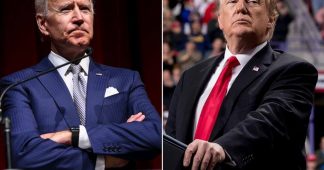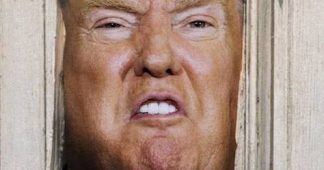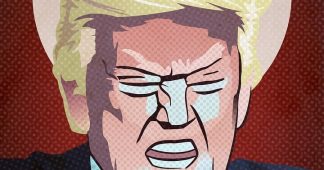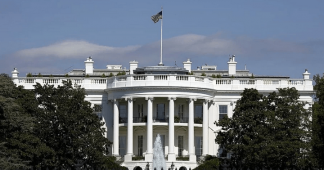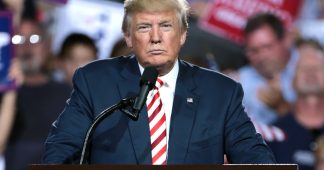Photograph by Nathaniel St. Clair
The United States is facing its most dangerous domestic crossroads since the Civil War. Donald Trump has told the nation that he would not necessarily abide by the results of the November election, that violence could not be ruled out in the wake of the election, and that a Joe Biden victory would be fraudulent. At last week’s tumultuous debate, Trump threatened to challenge a possible defeat in next month’s election in the Supreme Court, the House of Representatives, or even in the street. Attorney General William Barr ominously stated that he would follow the results of the election if the results were “clear.”
In the 1930s, fascism and communism in Europe challenged the liberal internationalism and globalism that developed after World War One. In 1933, Adolf Hitler—who had been chancellor for less than a month—exploited a mysterious fire at the Reichstag, the German parliament, to get an Enabling Act, establishing a state of emergency and creating the pretext for forming a dictatorship. In the wake of a mysterious fire at the St. John’s Episcopal Church, on the first of June, 2020, there have been a series of provocative statements and actions by the Trump administration. A drumbeat of propaganda has challenged the credibility of the November elections and the sovereignty of our governing institutions.
Trump’s actions in the wake of the church fire were profoundly symbolic, particularly his blasphemous photo opportunity with upside-down bible in hand. He had the support of Attorney General Barr, and the participation of Secretary of Defense Mark Esper and Chairman of the Joint Chiefs of Staff General Mark Milley. Esper and Milley have essentially apologized for their participation at Lafayette Square, but Barr has increased his partisan defense of Trump. Barr has lied about his role in Lafayette Square, and joined Trump in casting doubt on the sanctity of our system of voting.
Even before Barr orchestrated the violent removal of peaceful protestors from the Square, Trump made a short statement in the White House Rose Garden that called on states to use the National Guard to “dominate the streets” and promised that, if they didn’t, he would “deploy the U.S. military and quickly solve the problem for them.” Trump has been encouraging violence in the streets to justify the use of federal force, which is central to the key element of his campaign—the emphasis on law and order.
Trump is the first U.S. president to condone force against journalists, making that part of his campaign rallies. At a rally in the battleground state of Minnesota last week, Trump targeted MSNBC reporter Ali Velshi by name and described his injury from a rubber bullet as a “beautiful thing. It’s called law and order.” Trump repeated his scurrilous comment several days later in the battleground state of Pennsylvania, referring to Velshi as “that idiot reporter.” Feeling the laughter of the crowd, Trump went on: “And he went down. I’ve been hit! I’ve been hit.” Recalling another incident where National Guard forces moved against a crowd that included reporters, Trump brayed “They threw [the reporter] aside like he was a little bag of popcorn.”
At a campaign event in Montana in 2018, Trump praised Rep. Greg Gianforte (R-MT) for body-slamming a journalist from The Guardian. And in 2016, Trump disgustingly used the physical disability of a reporter from the New York Times as fodder for his rallies. The constant references to the press as the “enemy of the people” is from the fascist playbook. It was one of Joseph Stalin’s favorite calumnies.
Trump and Barr are exacerbating the political polarization of the country, calling out Democratic mayors in major cities and threatening cuts in federal funding. They have accused these mayors of allowing “rioters and anarchists to engage in violence and destruction.” When Trump tried to cut funding to several cities over their immigration policies, the federal appeals court ruled that the move violated the separation of powers spelled out in the Constitution. But Trump has politicized the courts, naming more than 200 federal judges as well as three Supreme Court justices. Barr has suggested using sedition laws to pursue protestors and the civic officials who don’t challenge them.
While many liberal politicians and pundits waste their time assessing Russian influence operations in the U.S. elections of 2016 and 2020, Trump and Barr are furthering their fascist campaign, accusing our schools and universities of “rewriting American history to teach our children that we were founded on the principle of oppression, not freedom.” At an event at the National Archives, Trump charged that the “left has warped, distorted, and defiled the American story with deceptions, falsehoods, and lies.” Trump, who was unfamiliar with the life and works of Frederick Douglas, presumably has never read a work of U.S. history or demonstrated curiosity—let alone understanding—of our past.
Trump’s Department of Education has attacked our public schools, which are already at risk of falling behind their European and Asian counterparts. There is support in the country for anti-racism education, but Trump and Secretary of Education Betsy DeVos are urging “patriotic education” to play down the central role of slavery. Trump’s attacks on climate change and science as well as on coronavirus and public health will further weaken our educational institutions.
Trump sees his third appointment to the Supreme Court as his guarantee to reelection, even if he fails to win a popular majority. Not only is Trump unwilling to state that he will leave office, Barr said that he would only leave if the results were “clear.” Neither would Trump commit to the importance of a peaceful succession, which is considered a hallmark of our democracy, stonewalling questions about the importance of a peaceful election. “Get rid of the ballots,” Trump argues, and “there won’t be a transfer {of power} frankly. There’ll be a continuation.”
The Trump administration’s campaign against a free and fair election is unprecedented in U.S. history. The Trump campaign has threatened to have “monitors” on the street the day of the election to intimidate voters, and has dispatched “monitors” with cellphone cameras to satellite election offices in key cities. Republican officials at the state level are limiting the number of ballot drop boxes in battleground states in an effort to compromise the November election.
John McNeill, a professor of history at Georgetown University, has taken note of other “fascist” aspects of the Trump presidency, including a view of the United States as victimized by foreigners; the militarism of the Department of Homeland Security; his readiness to use violence against peaceful protestors; and his distrust of international agreements. There has been much discussion of Trump’s withdrawal from international agreements and institutions, which has bolstered cynicism toward liberal internationalism and globalism.
It took the mainstream media much too long to recognize and deplore Trump’s racism. The racist travel ban was introduced in 2017, and the white supremacist rally in Charlottesville also took place in 2017. National Public Radio, however, didn’t apply the word “racist” to Trump until the summer of 2019, when he tweeted that four Democratic congresswomen—all women of color—should “go back” where they came from. Similarly, cable television failed to refer to Trump’s many lies until recently, when the cable networks began introducing corrections to the president’s “alternative facts.” When then senior advisor Kellyanne Conway credited the administration with offering “alternative facts,” she was declaring the right to lie.
The first days of the Trump presidency were dominated by a series of lies regarding the size of his inauguration crowd. In the wake of the inauguration, we have witnessed the antics of a president who is obsessed with parades and rallies on his behalf. There is some truth to the notion that Trump’s visit to Mt. Rushmore this past summer was more than a photo opportunity. The campaign rallies currently being staged are particularly loathsome in view of the flouting of CDC recommendations regarding the danger of indoor events and the importance of face masks. Herman Cain, a former presidential candidate, died from the coronavirus presumably contracted at Trump’s Tulsa rally. The vulgar display of fireworks spelling out the name “Trump” at the Republican convention in August was reminiscent of Hitler’s vulgar Nuremberg rallies.
The loathsome and fascist tendencies of Donald Trump are well established. The philosopher John Locke warned that “wherever law ends, tyranny begins.” Trump’s threats regarding the November election, threatening to throw the results of the election into the Supreme Court, or the House of Representatives, or even the “street,” warns us that our nation has reached a dangerous juncture. At last week’s debate, Trump encouraged supporters to “go into the polls” and “watch very carefully” what is taking place. The president has instructed the Proud Boys, a right-wing gang of thugs, to “Stand back and stand by.” On November 3rd, we will learn whether the United States decides to bolster its democratic republic or take the road to authoritarian fascism.
Published at www.counterpunch.org
